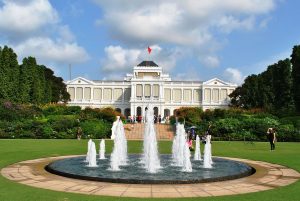Three candidates have qualified to run in the election for the Singaporean presidency on September 1, the country’s Elections Department (ELD) announced on Friday.
In a press statement, the ELD announced that Tharman Shanmugaratnam, a People’s Action Party (PAP) grandee and former senior minister, will compete for the position with Ng Kok Song, an ex-chief investment officer of the sovereign wealth fund GIC, and Tan Kin Lia, the former head of the insurance company NTUC.
The ELD said that the Presidential Elections Committee (PEC) had received six applications for the certificate of eligibility before the August 17 deadline, but only three qualified. It said that the six-member PEC determined that the three approved candidates were all men of “integrity, good character and reputation.”
Singapore has stringent criteria for those who can run for the largely ceremonial role. Candidates must have served as a senior civil servant for three years or have served as the chief executive of a company with shareholders’ equity of at least S$500 million ($372 million) for three years, and made an after-tax profit for the entire time. Three of the last four Singaporean elections – in 2017, 2005, and 1999 – have been uncontested.
Perhaps the most prominent prospective candidate not to make the cut was George Goh, an entrepreneur, business leader, and former non-resident ambassador to Morocco. The ELD did not mention him in its Friday announcement, but it was unclear whether the businessman satisfied the private sector criteria for qualification. As the chief executive of five companies, none of which reaches the shareholder equity threshold of S$500 million, Goh had applied under the so-called “deliberative track,” under which the candidate must satisfy the PEC that he or she has the experience and ability “comparable to the experience and ability of a person who has served as the chief executive of a typical company.”
Of the approved candidates, Tharman, 66, is very much the frontrunner, having served in a number of high-ranking positions in the PAP-led government, including as senior minister between 2019 and 2023, deputy prime minister from 2011 to 2019, and chairman of the Monetary Authority of Singapore from 2011 to 2023.
That said, Ng Kok Song, 75, is hardly an outsider, given his more than 30-year career in the sovereign wealth fund GIC, which was capped off by a stint as chief investment officer from 2007 to 2013. He said last week that his presidential bid was prompted by “recent concerns about the integrity of our national institutions.” Tan Kin Lian, also 75, will be running for the second time, after a failed bid in 2011. He is seeking to position himself as an “independent” candidate against Tharman and Ng, whom he claims “represent the establishment.”
As some critics have pointed out, the tightly managed process for choosing the president, like Singapore’s political system as a whole, tightly delimits the range of possible outcomes, to the detriment of accountability. As Kevin Tan and Cherian George argued last month, all of this restricts the ability of the presidency to provide an independent check on the PAP-led government.
“Whoever wins, Singapore’s Presidential Election is destined to disappoint,” they wrote. “This has little to do with the quality of the men who want to run, and everything to do with the lack of consensus about the rules of the race and the nature of the prize.”

































